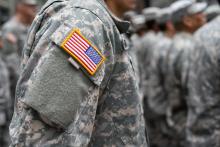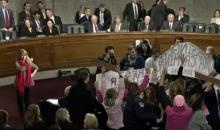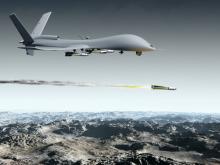drone warfare

THE CONTROVERSIAL Jan. 29 attack by U.S. forces on a rural township in Yemen exemplifies the failed U.S. policy in the region.
In the first military raid carried out by the Trump administration, one U.S. soldier and at least 25 civilians were killed in the attack on the village of al-Ghayil in central Yemen, including nine children under the age of 13. Among these was 8-year-old Nawar al-Awlaki, an American citizen, who was shot in her family’s house. Other civilians killed included visitors whose family has been active in U.N.-mediated de-escalation committees, working to quell violence in the region.
Some leaders of al Qaeda in the Arab Peninsula (AQAP) also lived in al-Ghayil. AQAP has taken advantage of Yemen’s multi-sided civil war to find refuge in remote areas. AQAP maintains an uneasy relationship with local tribes, many of whom abhor al Qaeda’s violent excesses and reactionary interpretation of Islam but respect AQAP’s ability to fight common enemies.
When Navy SEALs found themselves under fire, they called in airstrikes. The barrage hit houses where families slept, killing people and livestock. Navy SEAL William “Ryan” Owens was also killed.
President Trump initially blamed his own generals and former President Obama for the botched raid. Then, in his first address to Congress, Trump pivoted, describing it as “a highly successful raid that generated large amounts of vital intelligence.” Owen’s widow was present; Trump referred to her multiple times in his address. Owen’s father refused to meet with the president and asked for an investigation into his son’s death.

I SERVED FIVE years as a U.S. Army reserve chaplain. This spring I submitted my resignation to the president of the United States. I refuse to support U.S. policies on armed drones, nuclear weapons, and the policy of “preventive war.” I told the president, “I refuse to serve as an empire chaplain.”
I grew up skeptical of military solutions and decided not to register for the Selective Service System when I turned 18. How, then, did I end up in the Army?
The call to bring my religious values of justice and compassion into the Army chaplaincy came in response to three realities: soldiers burdened by multiple deployments, a military replete with uniformed evangelicals occupying Muslim lands, and the torture at Abu Ghraib.
As chaplain I was pastor: nurturing the living, caring for the wounded, and honoring the dead. However, I also claimed the prophetic biblical imperative to “speak truth to power.”
When I witnessed drone warfare in Afghanistan, my anguish peaked. In 2012, I preached a sermon titled “A Veterans Day Confession for America” lamenting drone killing and “preventive war.” Military commanders reacted harshly. I was discharged with a reprimand and negative evaluation. I learned that U.S. military chaplains are not allowed to have a prophetic voice; they are expected to be nothing more than empire chaplains.

Glancing upward at one of the six U.S.-manufactured aerostat blimps performing constant surveillance over Kabul, I wonder if the expensive, high-tech, giant’s-eye view encourages a primitive notion that the best way to solve a problem here is to target a “bad guy” and then kill him. If the bad guys appear to be scurrying dots on the ground below, stomp them out. But crushing only the right dots has proven very difficult for a U.S. drone warfare program documented to have killed many civilians.

President George W. Bush let innumerable attacks on his decisions, intelligence, and character roll off his back while he was in office. But facing the families of soldiers killed in Iraq and Afghanistan took a heavy emotional toll on his presidency.
Bush wrote more than 4,000 letters to these families. He also met with many of them, behind closed doors and away from cameras and reporters. The dramatic scenes, according to first lady Laura Bush, were “incredibly emotional.”

Addressing moral injury in film is important. Addressing pertinent political issues like drone warfare is also important. But Good Kill doesn’t say anything an editorial wouldn’t, and takes about three times as long to say it. With this film, Andrew Niccol tries to create a sense of disassociation similar to what his drone pilot protagonist would feel. Sadly, the end isn’t compelling enough to justify the means. Good Kill ends up being a ponderous slog, a film that wants to be a conversation-starter but doesn’t introduce any new or interesting entry points into that conversation.

After a week here in FMC Lexington Satellite camp, a federal prison in Kentucky, I started catching up on national and international news via back issues of USA Today available in the prison library. An "In Brief" item, on p. 2A of the Jan. 30 weekend edition, caught my eye. It briefly described a protest in Washington, D.C., in which members of the antiwar group "Code Pink" interrupted a U.S. Senate Armed Services budget hearing chaired by Sen. John McCain (R-Ariz.). The protesters approached a witness table where Henry Kissinger, Madeleine Albright, and George Schulz were seated. One of their signs called Henry Kissinger a war criminal. "McCain," the article continued, "blurted out, 'Get out of here, you low-life scum.'"
At mail call, a week ago, I received Richard Clarke's novel, The Sting of the Drone, about characters involved in developing and launching drone attacks. I'm in prison for protesting drone warfare, so a kind friend ordered it for me. The author, a former "National Coordinator for Security and Counterterrorism," worked for 30 years inside the U.S. government but seems to have greater respect than some within government for concerned people outside of it. He seems also to feel some respect for people outside our borders.
He develops, I think, a fair-minded approach toward evaluating drone warfare given his acceptance that wars and assassinations are sometimes necessary. (I don't share that premise). Several characters in the novel, including members of a House Permanent Select Committee on Intelligence, criticize drone warfare, noting that in spite of high level, expensive reconnaissance, drone attacks still kill civilians, alienating people the U.S. ostensibly wants to turn away from terrorism.

On Oct. 7, Georgia Walker and I appeared before Judge Matt Whitworth in a Jefferson City, Mo., federal court on a charge of criminal trespass to a military facility. The charge was based on our participation in a June 1 rally at Whiteman Airforce Base protesting drone warfare. Walker and I attempted to deliver a loaf of bread and a letter to the base commander, encouraging the commander to stop cooperating with any further usage of unmanned aerial vehicles, (drones) for surveillance and attacks.
The prosecutor, USAF Captain Daniel Saunders, said that if we would plead guilty to the charge, he would seek a punishment of one month in prison and a $500 fine. We told the prosecutor we could accept a “no contest” plea but were not willing to plead guilty. The prosecutor then said he would recommend a three-month prison sentence and a $500 fine. The judge refused to accept a “no contest” plea. We then requested a trial, which has been set for Dec. 10.

“The final perversion is the reversal of who is the real victim here: the commander of a military base whose drones kill innocent people halfway around the world, or those innocent people themselves who are the real ones in need of protection from the terror of U.S. drone attacks?”

On May 23, President Obama gave a major address from the National Defense University, in which he personally acknowledged for the first time the U.S. government’s killing of four Americans — along with scores of others — under its program of assassination by remotely controlled drones. I was able to watch this televised speech from the privileged vantage of a federal prison on the last day of a sentence resulting from my protest of drones operated from Whiteman Air Force Base in Missouri.
Over the previous six months in the Federal Prison Camp at Yankton, S.D., I had watched from afar as the discussion on drone warfare emerged from the fringe and into the mainstream. Fellow prisoners brought me clippings on the subject from their local newspapers and kept me apprised of what they heard on the evening news. The American people seemed to be just awakening to the reality and consequences of wars being fought and assassinations carried out by unmanned but heavily armed planes controlled by combatants sitting at computer screens at stateside bases far from the conflict.

Dear Liberty University,
I want to write truthfully about God. I know many will find that an odd way to begin a letter about U.S. drone warfare, but I see no other way. This morning, I was discouraged to read that Liberty University has been training Christians to pilot armed U.S. drones since 2011 in your School of Aeronautics (SOA). The reasons for my discouragement are many — not least of which is the idea that Liberty graduates can somehow "serve the Lord" by targeting and killing their neighbors. Here, I would like to outline some of my concerns in detail with the hope that Liberty might reconsider, or at least restate theologically, its position regarding U.S. drone warfare.